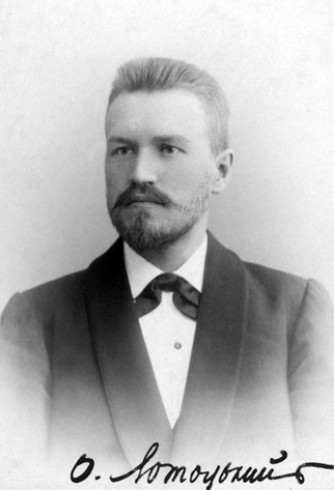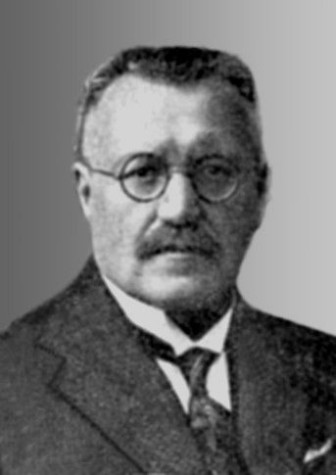Lototsky, Oleksander
Lototsky, Oleksander [Лотоцький, Олександер; Lotoc'kyj] (pseuds: O. Bilousenko, O. Liubenky, and Spectator), b 22 March 1870 in Bronnytsia, Mohyliv county, Podilia gubernia, d 22 October 1939 in Warsaw. Civic and political figure, writer, publicist, and scholar; full member of the Shevchenko Scientific Society (from 1900) and the Ukrainian Scientific Society in Kyiv; father of Oksana Lototska-Tokarzewski. After graduating from the Kyiv Theological Academy in 1896, he worked (1900–17) in the Ministry of State for the Control of Finances in Kyiv and then in Saint Petersburg, where he rose to the position of deputy general comptroller. An active member of the Society of Ukrainian Progressives from 1908, he assisted in establishing the Ukrainian caucus in the Russian State Duma. He became head of the Ukrainian National Council in Petrograd in 1917 and then gubernial commissioner of Russian-occupied Bukovyna and Pokutia. His positions in the Ukrainian National Republic government included that of secretary general (September–November 1917) and state comptroller (1918) in the General Secretariat of the Central Rada, and in the Hetman government he was minister of religious affairs (October–November 1918). As acting minister of religious affairs under the Directory of the Ukrainian National Republic Lototsky was instrumental in the declaration of autocephaly by the Ukrainian Orthodox church (1 January 1919) (see Ukrainian Autocephalous Orthodox church). He also went to Constantinople as minister plenipotentiary to obtain the patriarch’s recognition of that church’s new status. He emigrated in 1920 to Vienna, then Prague, and finally Warsaw. He served as a docent and eventually professor of canon law at the Ukrainian Free University (1922–8) and professor of Orthodox church history at Warsaw University (1929–39). He was a founder and director (1930–9) of the Ukrainian Scientific Institute in Warsaw. He was also minister of internal affairs and deputy premier in the Government-in-exile of the Ukrainian National Republic (1927–30).
Lototsky's earliest publications (1889) were children's books. He published readers and the anthology Vinok (The Wreath) and helped found the Vik publishing house. In the 1890s his scholarly and popular studies began to appear in Kievskaia starina, the journal Pravda, Literaturno-naukovyi vistnyk, and Zapysky Naukovoho tovarystva im. Shevchenka. He contributed articles on economics to Russian economic journals, Ukrainskii vestnik (Saint Petersburg), and Ukrainskaia zhizn’. He wrote many articles on the history of schools in Ukraine and Russia. As a publicist he contributed hundreds of articles to leading (usually liberal) Russian journals and newspapers defending Ukrainian causes. As a church activist he collaborated with the Synod in publishing a Ukrainian translation of the Gospel, wrote textbooks on the Old and New Testaments, and belonged to the commission for translating liturgical books at the Ukrainian Scientific Institute in Warsaw. Lototsky was also active in civic affairs. He promoted the printing of Ukrainian books, and in the 1900s he was active in the revival of Ukrainian-language publishing. He defended Ukrainian interests before the Saint Petersburg bureaucracy. A liberal democrat and a republican, he belonged to the Ukrainian Democratic Radical party, which later became the Ukrainian Party of Socialists-Federalists. Lototsky remained active while abroad in writing articles for foreign journals (Turkish, Greek, Finnish, Czechoslovakian, Polish, and French) and participating in various civic and cultural undertakings.
Lotosky’s major writings include studies of cathedral chapters in Ukraine in the 15th and 16th centuries (1896) and of the social position of the secular clergy in Ukraine and Russia in the 18th century (1898), as well as Ukraïns'ki dzherela tserkovnoho prava (Ukrainian Sources of Ecclesiastical Law, 1931; repr 1984) and Avtokefaliia (Autocephaly, 2 vols, 1935–8). His memoirs, Storinky mynuloho (Pages of the Past, 4 vols, 1932–4) and V Tsarhorodi (In Constantinople, 1939; repr 1966), are valuable sources for the history of Ukrainian cultural and civic life in the late 19th and early 20th centuries.
Roman Smal-Stotsky
[This article originally appeared in the Encyclopedia of Ukraine, vol. 3 (1993).]


.jpg)